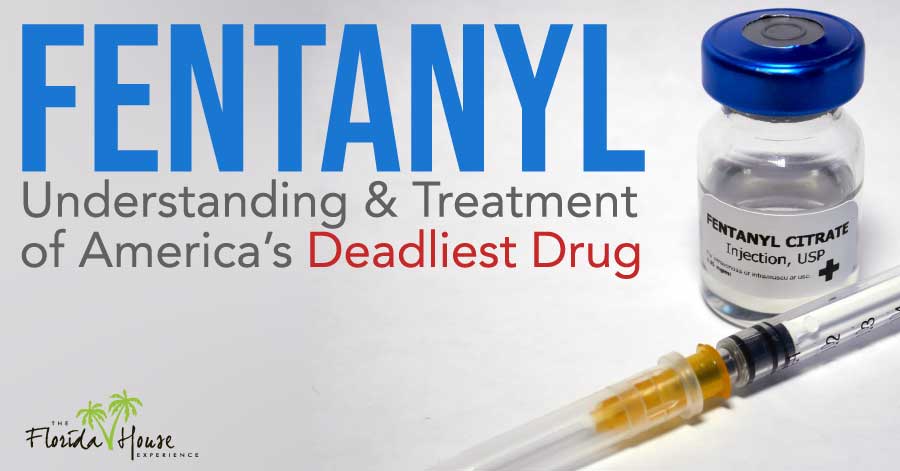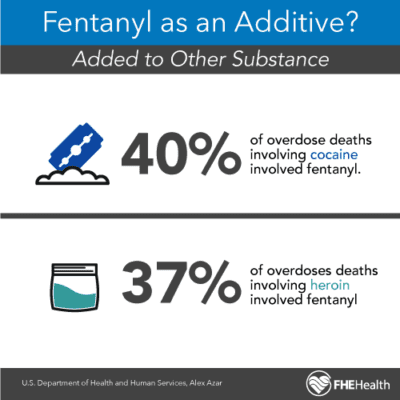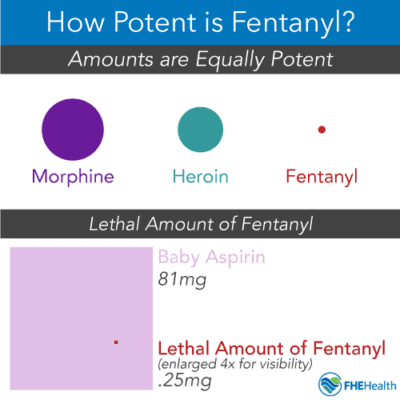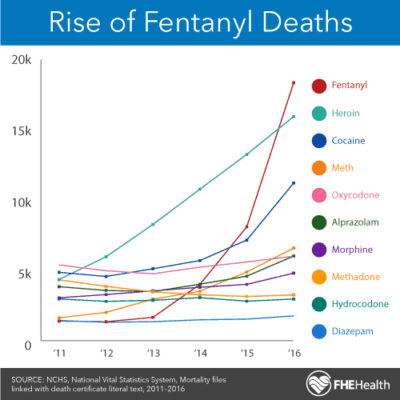
|
|
As the opioid crisis in America continues to evolve, more and more people are dying as a result of overdoses on one of a variety of drugs, both illicit and legally prescribed. The issue is that these drugs are as easy to access as they’ve ever been, and more and more dangerous varieties are also hitting unregulated markets by way of a number of different channels.
Nothing better illustrates this than the results learned from a 5-year study, in which health officials recorded the drugs used by everyone who suffered a fatal overdose between 2011 and 2016. In summary, the CDC found that fentanyl was the drug at the heart of the most overdose deaths, both by itself and in combination with other drugs.
In this article, we’ll discuss what fentanyl is, why it’s so dangerous and why it’s so important to seek treatment if you or a loved one are misusing fentanyl or any other opiate, whether it was legally prescribed or not.
What Is Fentanyl?
 Fentanyl is high-strength pain reliever given to patients who no longer respond to standard opioid analgesic medications. It has been slowly being phased out of therapeutic use due to the fact that it’s much stronger than any other natural opiates, including morphine and heroin.
Fentanyl is high-strength pain reliever given to patients who no longer respond to standard opioid analgesic medications. It has been slowly being phased out of therapeutic use due to the fact that it’s much stronger than any other natural opiates, including morphine and heroin.
In recent years, fentanyl has been more commonly manufactured outside of FDA-approved labs by street-level dealers, and either sold as is or mixed in with other drugs.
Why Is Fentanyl So Dangerous?
According to the CDC, over 19,000 overdose deaths involved fentanyl in 2016. The danger of fentanyl is two-fold: the drug is becoming more widely available, and it’s also much stronger than other opiates. This means that using fentanyl by itself presents a higher risk of an overdose than using other opiates.
How Strong is Fentanyl, Really?
 Fentanyl is one of the strongest opiates used in medical settings, and street varieties of this synthetic drug may be even stronger. For scale, medical fentanyl can be 50 to 100 times stronger than morphine, another very strong pain reliever offered to patients with severe pain, according to CNN. Heroin, which is an illegal opiate responsible for a high number of overdose deaths itself, can be around 30 to 50 times weaker than fentanyl.
Fentanyl is one of the strongest opiates used in medical settings, and street varieties of this synthetic drug may be even stronger. For scale, medical fentanyl can be 50 to 100 times stronger than morphine, another very strong pain reliever offered to patients with severe pain, according to CNN. Heroin, which is an illegal opiate responsible for a high number of overdose deaths itself, can be around 30 to 50 times weaker than fentanyl.
In fact, fentanyl is so strong, it can be absorbed into the skin, which is why more and more law enforcement and drug control officials are wearing gloves during operations where there’s any chance exposure to fentanyl or one if its analogs may occur. There have been numerous cases of officers having to receive treatment for mild symptoms of an overdose just from handling one of these extremely dangerous drugs on a person’s clothing or body.
Part of a Deadly Mix
 Fentanyl is also very cheap to produce, which poses an additional threat. Officials are finding that fentanyl is being mixed into various forms of cocaine, both as a way to increase profit margins on the cocaine and as a new way of taking the drug. Whether the user knows that their crack or powder cocaine contains a small amount of fentanyl or not, this increases the risk of overdose by a substantial margin.
Fentanyl is also very cheap to produce, which poses an additional threat. Officials are finding that fentanyl is being mixed into various forms of cocaine, both as a way to increase profit margins on the cocaine and as a new way of taking the drug. Whether the user knows that their crack or powder cocaine contains a small amount of fentanyl or not, this increases the risk of overdose by a substantial margin.
Mixing fentanyl with other drugs is becoming a common reason for fatal overdoses. The Secretary of the U.S. Department of Health and Human Services, Alex Azar, said as much in December 2018, pointing to CDC data that shows that 40 percent of overdose deaths involving cocaine also involved fentanyl. Similarly, in heroin-related overdose deaths, fentanyl was involved 37 percent of the time.
Lessons from the Data
These numbers are particularly shocking when it comes to the addiction treatment community. Because fentanyl is so strong and often being consumed without realizing it, it can kill before the user has a chance to recognize that they may need help. The important thing to note is that even when you think you have your drug use under control, there’s always the chance that something could go wrong. The best way to manage your addiction is with care and supervision by qualified professionals.
If you or a loved one are struggling with addiction, it’s never too soon to seek treatment. For more information, contact FHE Health today.






